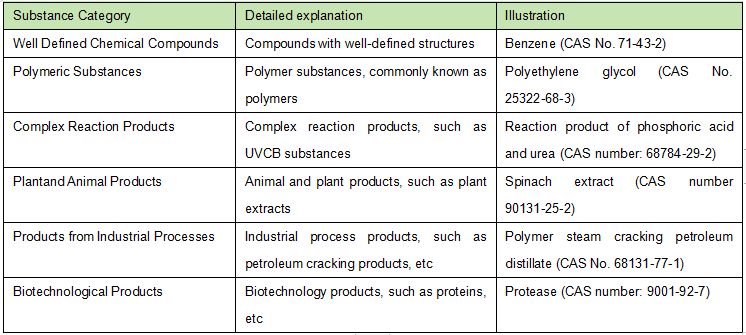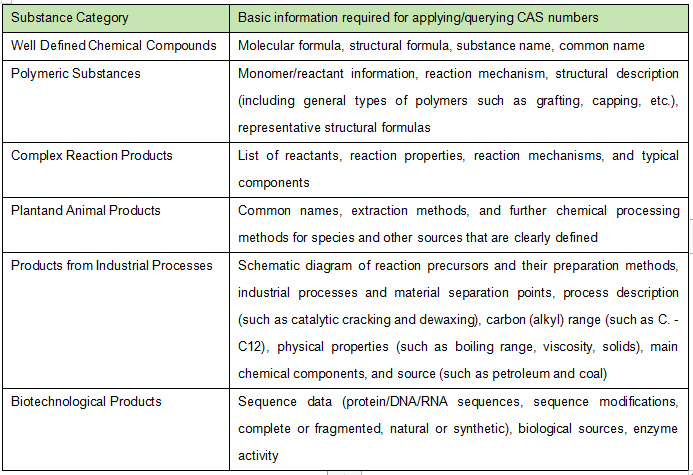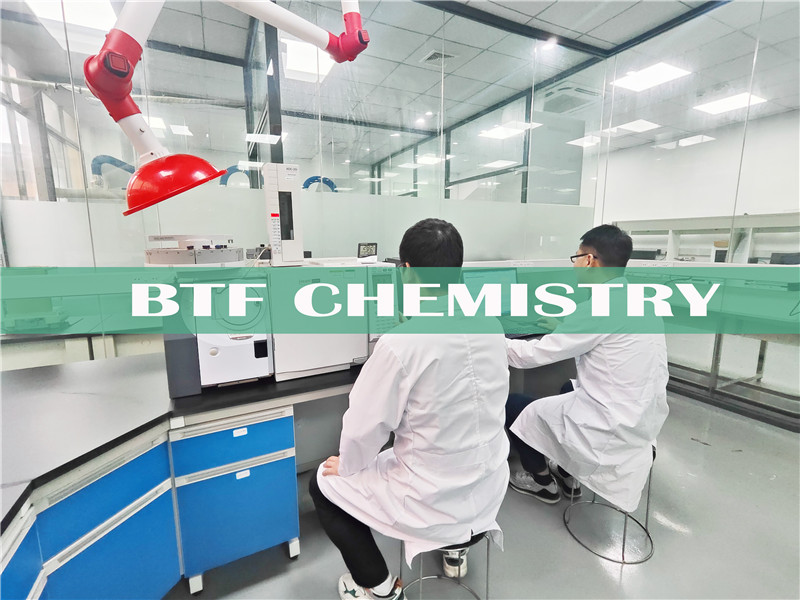The CAS number is a globally recognized identifier for chemical substances. In today's era of trade informatization and globalization, CAS numbers play an important role in identifying chemical substances. Therefore, more and more researchers, producers, traders, and users of chemical substances have a demand for CAS number applications, and they hope to have more understanding of CAS number and CAS number applications.
1.What is a CAS number?
The CAS (Chemical Abstract Service) database is maintained by the Chemical Abstracts Society (CAS), a subsidiary of the American Chemical Society. It collects chemical substances from scientific literature since 1957 and is the most authoritative collection database of chemical substance information. The chemicals included in this database can be traced back to the early 20th century, and thousands of new substances are updated daily.
Each listed chemical substance is assigned a unique CAS Registry Number (CAS RN), which is the authoritative identification number for chemical substances. Almost all chemical databases allow substance retrieval using CAS numbers.
The CAS number is a numerical identifier that can contain up to 10 digits and is divided into three parts by a hyphen. The rightmost digit is a checksum used to verify the validity and uniqueness of the entire CAS number.
2.Why do I need to apply/search for a CAS number?
Chemical substances can be described in many different ways, such as molecular formulas, structural diagrams, system names, common names, or trade names. However, the CAS number is unique and only applies to one substance. Therefore, the CAS number is a universal standard used to determine chemical substances, which is relied upon by scientists, industry, and regulatory agencies in need of authoritative information.
In addition, in the actual trade of enterprises, it is often necessary to provide the CAS number of chemical substances, such as customs chemical filing, foreign chemical transactions, chemical registration (such as TSCA declaration in the United States), and the application for INN and USAN.
The CAS numbers of most common substances can be found in publicly available databases, but for substances with patent protection or newly generated substances, their CAS numbers can only be obtained by searching or applying to the American Chemical Abstracts Service.
3. Which substances can be applied for a CAS number?
CAS Society roughly divides the substances that can apply for CAS numbers into the following 6 categories:
In addition, the mixture cannot apply for a CAS number, but each component of the mixture can apply for a CAS number separately.
Items excluded from regular CAS applications include: substance category, item, biological organism, plant entity, and trade name, such as aromatic amines, shampoo, pineapple, glass bottle, silver compound, etc.
4.What information is required for applying/querying a CAS number?
For the above 6 types of substances, CAS Society has provided basic information requirements, and also recommends that applicants provide detailed substance information and relevant auxiliary information as much as possible, which helps CAS Society accurately and efficiently identify the applied substances, avoid correction situations, and save application costs.
5. CAS number application/inquiry process
① The standard process for applying/querying CAS numbers is:
② The applicant prepares the materials as required and submits the application
③ Official review
④ Information supplementation (if any)
⑤ Official feedback on application results
⑥ Official issuance of administrative fee invoice (usually within two weeks after the application result is issued)
⑦ Applicant pays administrative fees
Application/inquiry cycle: The official normal feedback cycle is 10 working days, and the processing cycle for urgent orders is 3 working days. The correction time is not included in the processing cycle.
6. Common questions about CAS numbers
① What are the contents of the CAS number application/query results?
It generally includes the CAS Registry Number (i.e. CAS number) and the CA Index Name (i.e. CAS name).
If there is already an existing matching CAS number for the applied substance, the official will inform the CAS number; If the applied substance does not have a matching CAS number, a new CAS number will be assigned. Meanwhile, the applied substances will be publicly included in the CAS REGISTRY database. If you wish to keep confidential material information, you can only apply for the CAS name.
② Is personal information disclosed during CAS number application/inquiry?
No, not really. The CAS number application/inquiry process is strictly confidential, and the CAS company has a complete and systematic confidentiality procedure. Without written permission, CAS will only discuss the details in the order with the person submitting the application.
③ Why is the official CA Index Name not exactly the same as the substance name provided by the applicant themselves?
The CAS name is the official name given to a substance based on the naming convention of CA Index Name, and each CAS number corresponds to a standard and unique CAS name. The substance names provided by the applicant may sometimes be named according to other naming rules such as IUPAC, and some may even be non-standard or incorrect.
Therefore, the name provided by the applicant is only for reference when applying/querying for CAS, and the final CAS name should be based on the name provided by CAS Society. Of course, if the applicant has any questions about the application results, they can also communicate further with CAS.
BTF Testing Lab is a testing institution accredited by China National Accreditation Service for Conformity Assessment (CNAS), number: L17568. After years of development, BTF has electromagnetic compatibility laboratory, wireless communication laboratory, SAR laboratory, safety laboratory, reliability laboratory, battery testing laboratory, chemical testing and other laboratories. Has a perfect electromagnetic compatibility, radio frequency, product safety, environmental reliability, material failure analysis, ROHS/REACH and other testing capabilities. BTF Testing Lab is equipped with professional and complete testing facilities, an experienced team of testing and certification experts, and the ability to solve various complex testing and certification problems. We adhere to the guiding principles of "fairness, impartiality, accuracy, and rigor" and strictly follow the requirements of the ISO/IEC 17025 testing and calibration laboratory management system for scientific management. We are committed to providing customers with the highest quality service. If you have any questions, please feel free to contact us at any time.
Post time: Jan-22-2024













